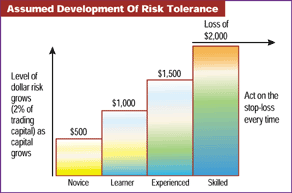MONEY MANAGEMENT
Risky Business
Experience And Dollar-Risk Tolerance Levels
by Daryl Guppy
As you gain trading experience, be aware of changes in your response to risk.
Trading is not an objective; it is a process. When you begin trading, you may have in mind some achievement or goal, and once you reach it, you may feel like an expert. Unfortunately, this demonstrates significant misunderstanding of the relationship between trading and skill development. More important, it ignores the way you develop as a trader. An experienced trader is not just someone who knows more than a novice; he or she is actually a different person.
EVOLUTION
As your skills develop and your experience accumulates, you tend to change in many ways. Trading solutions that were appropriate when you were a novice may no longer work well. In addition, personality changes develop in response to many factors, especially:
Your trading experience. Your maturity level as you grow older and encounter a broader range of life experiences. Lifestyle changes unrelated to trading. This might include relationship breakups or experiencing a major trauma such as a car accident. Your age. Your general approach to spending money is different when you are 30 than when you are 60.
All of these factors affect your ability to manage risk with an effective stop-loss approach. The longer you trade, the more you will understand that psychology plays a vital part in your trading success. Your emotions, actions, and experiences will have interesting and unexpected consequences on your behavior. Some of them are not pretty.

FIGURE 1: DEVELOPMENT OF RISK TOLERANCE. Here you see how your risk tolerance changes as you become a more experienced trader, even while keeping your risk level at 2% of your trading capital.
...Continued in the February issue of Technical Analysis of STOCKS & COMMODITIES
Excerpted from an article originally published in the February 2004 issue of Technical Analysis of STOCKS & COMMODITIES magazine. All rights reserved. © Copyright 2004, Technical Analysis, Inc.
Return to February 2004 Contents